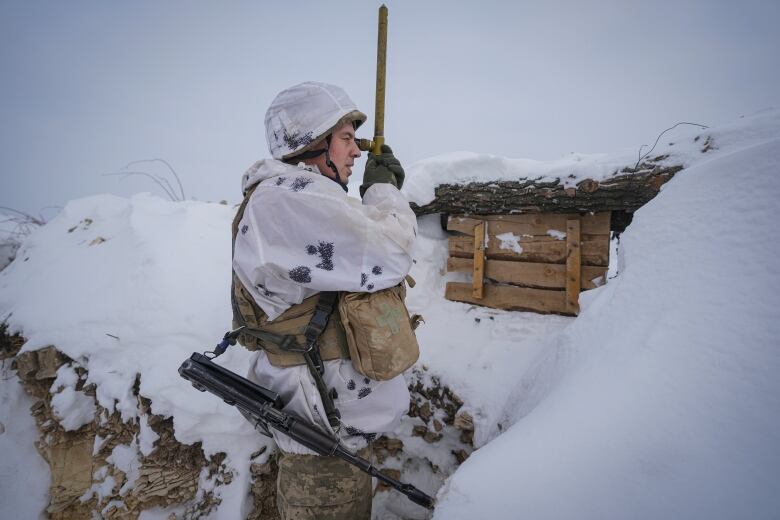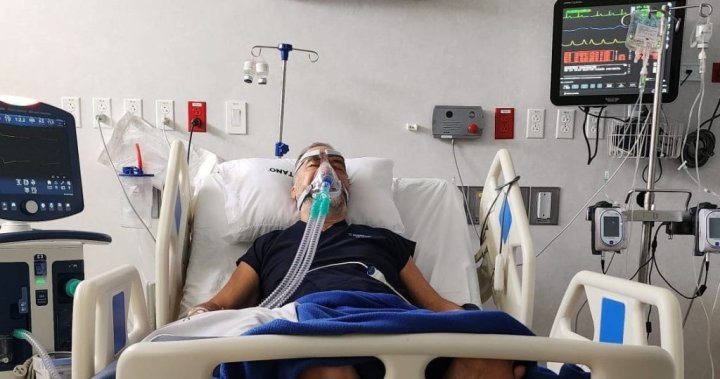Russian Foreign Minister Sergei Lavrov said Friday that Moscow will not start a war in Ukraine, but warned that it wouldn’t allow the West to trample on its security interests, amid fears it is planning to invade its neighbour.
U.S. President Joe Biden warned Ukraine’s leader a day earlier that there is a “distinct possibility” that Russia could take military action against the former Soviet state in February.
“There won’t be a war as far as it depends on the Russian Federation — we don’t want a war,” Lavrov said in a live interview with Russian radio stations. “But we won’t let our interests be rudely trampled on and ignored.”
Tensions have soared in recent weeks, and the United States and its NATO allies warily eyed a buildup of more than 100,000 Russian troops near Ukraine, worrying that Moscow was preparing to attack.
‘Little ground for optimism’
Russia has repeatedly denied having such plans, but has demanded that NATO promise Ukraine will never be allowed to join the alliance and that NATO roll back deployments of troops and military equipment in Eastern Europe.
The U.S. and NATO formally rejected those demands this week, though Washington outlined areas where discussions are possible, offering hope that there could be a way to avoid war.
Russia’s official response to those proposals will come from President Vladimir Putin, but the Kremlin has said there was “little ground for optimism.”
Lavrov echoed that grim note Friday.
“While they say they won’t change their positions, we won’t change ours,” he said. “I don’t see any room for compromise here.”
Putin meets with France’s Macron
Putin opened the weekly meeting of his Security Council on Friday, saying only that it would address foreign policy issues.
Later, in a video call with French President Emmanuel Macron, the Kremlin said Putin emphasized that the U.S. and NATO failed to consider Russia’s key demands: precluding NATO’s expansion, stopping the deployment of alliance weapons near Russian borders and rolling back its forces from Eastern Europe.
At the same time, Putin spoke in favour of continuing talks about a stalled peace agreement for eastern Ukraine, where Russia-backed rebels are fighting Ukrainian forces. Those talks are among Russia, Ukraine, France and Germany, and presidential envoys from the four countries met in Paris on Wednesday and agreed to have another meeting in Berlin in two weeks.
Following the 2014 ouster of a Kremlin-friendly president in Kyiv, Moscow annexed Ukraine’s Crimean Peninsula and began backing the insurgency in the country’s eastern industrial heartland.

Earlier, Lavrov noted that the U.S. suggested the two sides could talk about limits on the deployment of intermediate-range missiles, restrictions on military drills and rules to prevent accidents between warships and aircraft. He said that Russia proposed discussing those issues years ago — but Washington and its allies never took them up on it until now.
While he described the U.S. offers as reasonable, he emphasized that Russia’s main concerns are to stop both NATO’s expansion and the deployment of the alliance weapons near Russia’s borders. He noted that international agreements say that the security of one nation must not come at the expense of others’ — and that he would send letters to ask his Western counterparts to address that obligation.
“It will be hard for them to wiggle out from answering why they aren’t fulfilling the obligations sealed by their leaders not to strengthen their security at the expense of others,” he said.
Military drills
As tensions build, Washington warned Moscow of devastating sanctions if it invades Ukraine, including penalties targeting top Russian officials and key economic sectors. Several senior U.S. officials also said Thursday that Germany would not allow a newly constructed pipeline — which is meant to bring gas directly from Russia — to begin operations if Russia invades Ukraine.
Asked about possible sanctions, Lavrov said that Moscow had warned Washington that their introduction would amount to a complete severing of ties.
While Moscow and the West are mulling their next steps, NATO said it was bolstering its deterrence in the Baltic Sea region, and the U.S. ordered 8,500 troops on higher alert for potential deployment to Europe.
Despite the alarming rhetoric, Ukrainian officials have repeatedly tried to project calm.
Ukraine’s Defence Minister Oleksii Reznikov told parliament Friday that the total number of Russian troops near Ukraine — about 130,000 — is comparable to Moscow’s military buildup in the spring of 2021, when Moscow eventually pulled its forces back after massive military exercises.
“We haven’t observed any events or actions of military character that significantly differ from what was going on last spring,” with the exception of the deployment to Belarus, Reznikov said.





More Stories
‘Pretty scary’: Ill Ontario man stranded in Costa Rica finally recovering in Canada | Globalnews.ca
Trump allies Meadows, Giuliani among 18 indicted in Arizona election interference case | CBC News
RCMP confirm 2 kayakers missing from Sidney, B.C., found dead in Washington state | CBC News